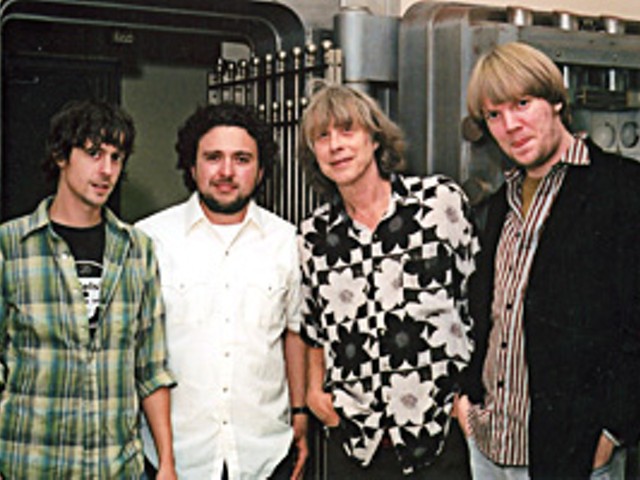Everyone knows the scene from O Brother, Where Art Thou?: A hooded Klansman stands between two torches and chants as the armies of the night assemble: "O'Death, O'Death, won't you spare me over for another year?" The voice is Ralph Stanley, the scene pure Coen Brothers: creepy, real and absurdly theatrical. The music of O'Death, a New York hardcore twang-punk band, captures that kind of gothic drama, the menacing underside of Americana — and then releases the sense of evil with a joyous clamor of banjos, mandolins, gypsy violins and percussive racket. The band's third LP (and first for the Kemado label), Broken Hymns, Limbs and Skin, sounds like Split Lip Rayfield tuning up with the Pogues before setting the collected works of Nathaniel Hawthorne and Flannery O'Connor on fire. The nightmares of the Puritans have never sounded quite so fun. B-Sides caught up with singer/guitarist Greg Jamie as the band drove as fast and as far away from Salt Lake City as possible.
Roy Kasten: I think it's interesting that you're a five-piece.
Greg Jamie: In what way?
In the sense of getting five dudes on the same page, musically.
Well, we're not really. That's what's interesting about the project. It's a convergence of different ideas, but we're open enough to each other and our separate influences that we can find a similar ground. And we're doing something different than if we were each in charge of a band, you know?
So if you were in charge, what would you be doing?
That's a tough question, especially in the band. Probably something quieter.
How has the band's style changed over the last few years?
It's a little more heady. There are more conceptual ideas, themes going around the lyrics, and definitely more complicated song structures. The playing is tighter, there's more precision. We've gotten away from the country feel, in terms of an old-timey thing.
You still have the country instruments, but the structures are more indie rock in feel. Was that a conscious decision?
I'm not sure how conscious it was. The songs are more a product of every person's involvement. If we were going to take each other seriously as bandmates, we had to have everyone put what they have into it. It's hard to think about how things have changed. It's not done yet, so it's hard to look backwards.
Do you think of the songs as more personal or theatrical?
It's a mix. There's a lot of storytelling, but there are some personal elements. But we're trying to create a certain mood with our songs and themes.
A lot of the voices come out of a wilderness.
There are things in the songs that people can connect with, a primal, return-to-nature thing. That's a big part of what we're about, and why it makes sense in this era. There's always that thing in music, art and film, where technology is moving forward, but there's a primal call in you to resist that in an aggressive way.
Are you concerned about an Obama presidency? National optimism could put a damper on O'Death.
Maybe we'll change with it. Hopefully there will still be a place for us.
You could have been huge if McCain had won.
I know I'm relieved that he didn't.
The band's music is a study in contrasts: The songs brood on the way of all flesh but the sound just leaps out with life.
There's a sense of mourning mixed with a more celebratory feel. Lyrically, we're more consistently brooding. I don't know if it will always be that way. That might have just been our mood when we made the album. We do want to have some happiness in our songs, at some point.





